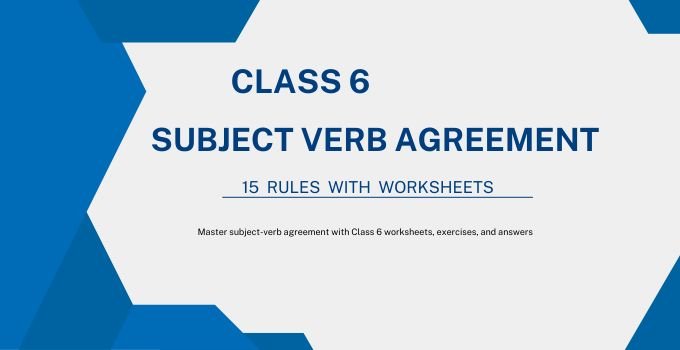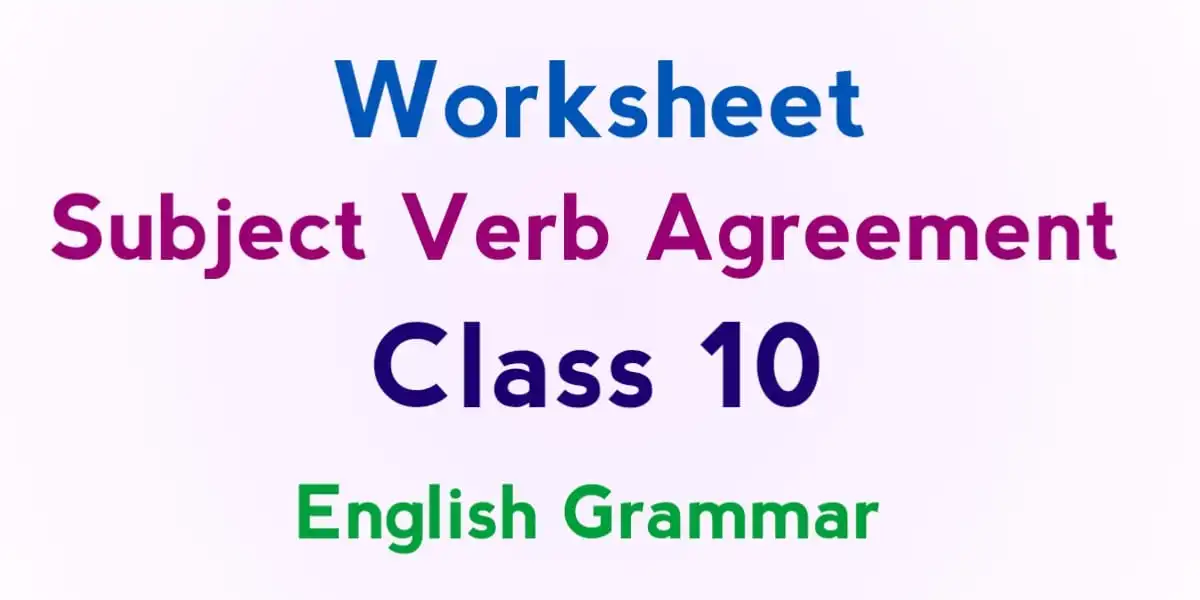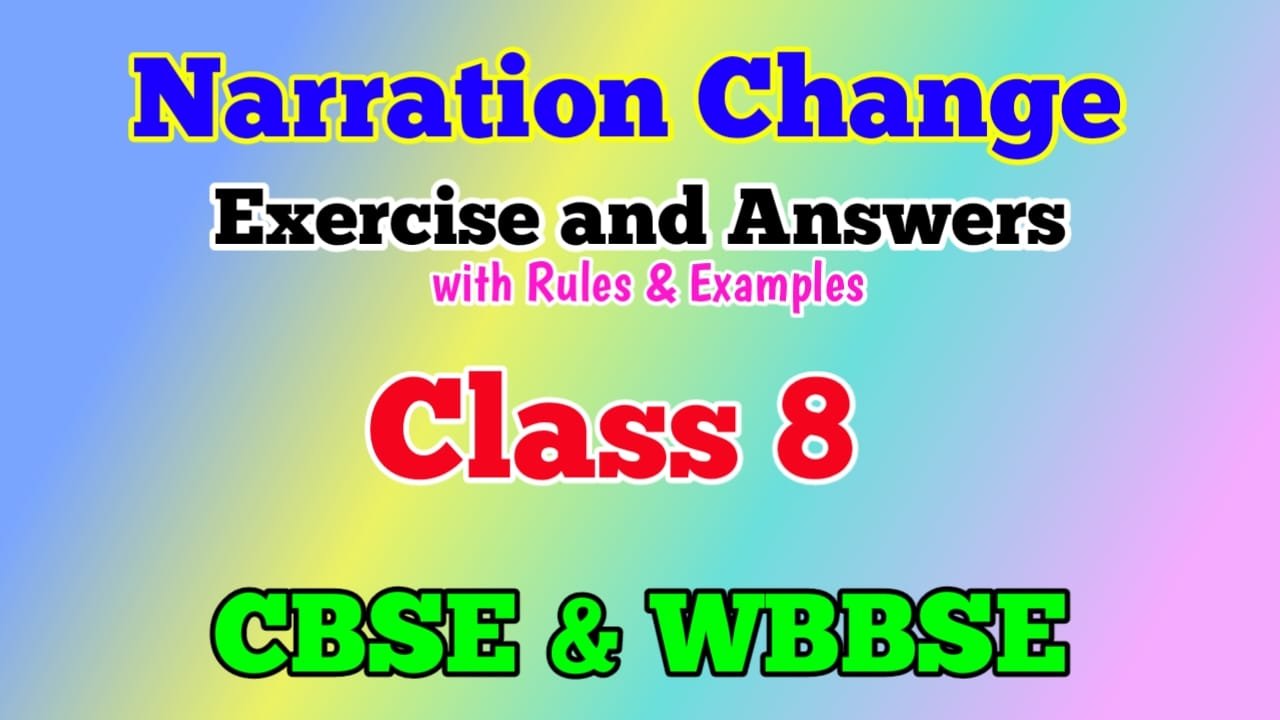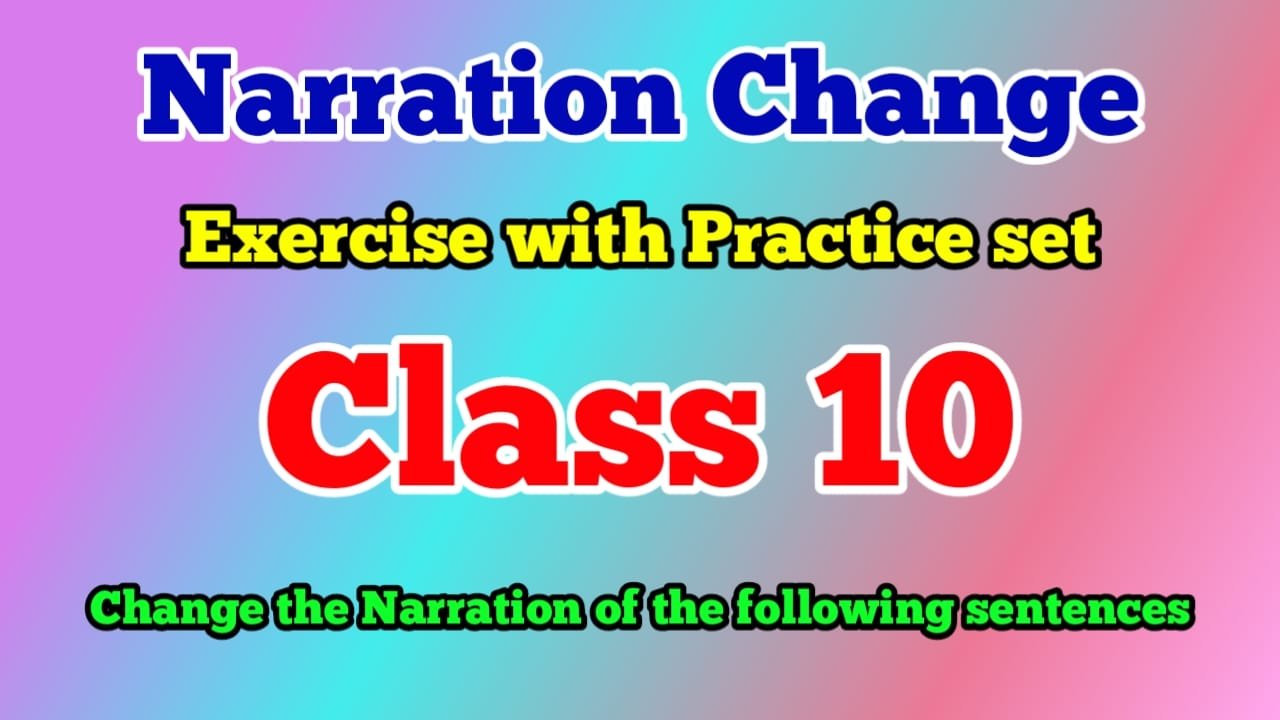Master subject-verb agreement with Class 6 worksheets, exercises, and answers. Enhance your grammar skills with the enlightening guide “15 Subject Verb Agreement Rules for Class 6 with Worksheets.”
Explore a world where coherence reigns supreme, highlighting the impact of improper subject-verb agreement. Delve into this comprehensive resource tailored for Class 6 students, featuring worksheets, exercises, and answers.
Subject-Verb Agreement Class 6 Worksheets Exercises Answers
Enhance Class 6 students’ grasp of subject-verb agreement with comprehensive worksheets featuring varied exercises and detailed answer keys for effective learning reinforcement.
English Grammar Ebook for Class 6
What is a Subject-Verb Agreement?
This is where it all begins. Subject-verb agreement is the fundamental rule that states that a singular subject must have a singular verb, and a plural subject must have a plural verb.
For example,
(i) The horse is running.
(ii) The horses are running.
This ensures that sentences are grammatically correct and convey the intended meaning.
Importance of Subject-Verb Agreement
(i) Subject-verb agreement ensures clear communication for readers or listeners.
(ii) Proper agreement maintains logical flow and structure in sentences.
(iii) Accurate alignment minimizes avoiding misunderstandings.
(iv) Enhance written and spoken communication.
(v) Effective agreement amplifies the impact of engaging with the audience.
People also ask
15 Subject Verb Agreement Rules for Class 6 for Worksheets
Discover 15 essential subject-verb agreement rules crafted for Class 6 students, accompanied by engaging worksheet exercises for effective learning.
Class 6 Subject and Verb Agreement Rule 1:
A. When two singular subjects are joined by the conjunction and, the verb is plural.
For example,
(i) The Meenakshi Temple and the Thyagaraja Temple are in Tamil Nadu.
(ii) My cousin and I are going to watch a film.
(iii) Singing and dancing are her hobbies.
Class 6 Subject and Verb Agreement Rule 2:
B. If two singular subjects are joined by and, but refer to the same person or idea, the verb is singular.
For example,
(i) Rice and fish is the staple diet of people in Kerala.
(ii) Bread and egg is good for breakfast.
Class 6 Subject and Verb Agreement Rule 3:
C. However, if we use the (definite article) before both singular subjects joined by and, the verb will be plural as it refers to two separate people or things.
For example,
(i) The player and the coach are late for the opening ceremony.
(ii) The snooker and the chess rooms have been painted.
Class 6 Subject and Verb Agreement Rule 4:
D. The verb is sometimes made through mistakes to agree in number with a noun or pronoun near it instead of with its original subjects. When a phrase or a clause comes between the subject and the verb, identify the subject carefully.
For example,
(i) The performance of the musicians is not satisfactory.
(ii) The lady who is wearing a green dress is a famous novelist.
Class 6 Subject and Verb Agreement Rule 5:
E. The words there and here are never the subject of a sentence.
For example,
(i) There are ten musicians in the school band.
(ii) There is no teacher in the staffroom.
(iii) Here is the nine o’clock news.
Class 6 Subject and Verb Agreement Rule 6:
F. The pronouns neither and either are singular and require singular verbs.
For example,
(i) Either of the girls is suitable for the job.
(ii) Neither of the two roads leads to my aunt’s house.
Class 6 Subject and Verb Agreement Rule 7:
G. Two singular subjects connected by or, either…or, or neither…nor require a singular verb.
For example,
(i) Either my uncle or my aunt is arriving today.
(ii) Neither the Principal nor the Headmistress is available
Class 6 Subject and Verb Agreement Rule 8:
H. In a sentence, singular and plural subjects are joined with conjunctions such as or, either…or, or neither…nor, the verb agrees with the noun or pronoun closest to it.
For example,
(i) Neither my friends nor my sister is willing to accompany me.
(ii) Neither my sister nor my friends are willing to accompany me.
Class 6 Subject and Verb Agreement Rule 9:
I. If a subject is plural in form but represents a singular noun, the verb is singular.
For example,
(i) The Invincibles is a very entertaining film.
(ii) Wuthering Heights is an English novel by Emily Brontë.
(iii) ‘After Twenty Years’ is an interesting short story by O Henry.
Class 6 Subject and Verb Agreement Rule 10:
J. When the subject of the sentence is plural and it represents a single unit of distance, time, weight, or money, the verb is singular.
For example,
(i) Ten kilos is heavy for a piece of cabin baggage.
(ii) Ten minutes is the reading time you will get before the examination.
Class 6 Subject and Verb Agreement Rule 11:
K. A collective noun takes a singular verb if the idea expressed is singular; it takes a plural verb if the idea expressed by the collective noun is plural.
For example,
(i) The government has decided to pass the Right to Food Act.
(ii) The people were confused about whether it was a public holiday or not.
Class 6 Subject and Verb Agreement Rule 12:
L. When expressions like as well as, together with, with, in addition to, along with, and besides, are used to join two singular subjects, the verb that is used is singular. However, if one subject is singular and the other is plural, the verb agrees with the first subject.
For example,
(i) Ronaldo, as well as Messi, is a brilliant player.
(ii) Rahul, besides Priya and Gauri, is invited to the party.
(iii) The bag, with all its contents, was washed away in the sea.
(iv) The general manager, together with her sales team, was given an award.
Class 6 Subject and Verb Agreement Rule 13:
M. The pronouns each, either, neither, everyone, one of the, take a singular verb.
For example,
(i) Each of these players plays well.
(ii) Either of the two teachers is good for teaching art.
(iii) Neither of the two diagrams is correct.
(iv) Everyone knows the new neighbours now.
(v) One of the new students has done this project.
Class 6 Subject and Verb Agreement Rule 14:
N. The expressions much and a little take a singular verb.
For example,
(i) Much has already been completed.
(ii) Only a little more is left.
Class 6 Subject and Verb Agreement Rule 15:
O. The expressions many, a few, several, and both take a plural verb.
For example,
(i) Many of the players were tired by the end of the first half of the game.
(ii) A few of the flowerpots are still empty,
(iii) Several traffic lights are not working today.
(iv) Both the captains have arrived on the field.
Subject-Verb Agreement Worksheets Exercises for Class 6
Practice makes perfect, and worksheets offer an excellent way to practice subject-verb agreement. These worksheets often present sentences with gaps that need to be filled with the correct verbs.
This hands-on approach helps students internalize the rule and apply it in their own writing. Remember, the more you practice, the more confident you’ll become.
Subject-Verb Agreement Worksheet 1:
A. Fill in the blanks with suitable verbs.
1. Rajni and Vimla __________ sisters.
2. Toast and butter __________ our favourite breakfast.
3. ‘Slow and steady wins the race. This __________ a famous saying.
4. Hema __________ a dancer and actress.
5. The Principal and the Vice Principal __________ called for a meeting.
6. Radha and Payal __________ coming to my house.
7. Ranveer and Pradeep __________ talented actors.
8. The director and the producer __________ left the studio.
9. The two parties __________ agreed to discuss the matter.
10. Bees, butterflies and moths __________ around in our garden.
Subject-Verb Agreement Worksheet 2:
B. Fill in the blanks with the correct form of the verbs in the brackets.
Asian elephants _______ (live) in the tropical forests and grasslands of Southeast Asia. They_______ (be) slightly smaller than African elephants, but (grow) up to nine feet tall and _______ (weigh) over 5,000kg-that’s heavier than two medium-sized cars! Even newbornso _______ (be) pretty heavy, weighing about a hundred kilograms. Given their size it _______ (be) no surprise that these animals _______ (eat) a lot. In a day, an adult Asian elephants human _______ (eat) nearly 75 times than what an average _______ (eat). Their ideal meal_______ (include) roots, grasses, fruit and bark. Much of an Asian elephant’s time _______ (be) spent searching for food. Asian elephants also. Enjoy _______ (enjoy) taking dips in the water. They are _______ (be) gentle and social. To communicate with each other, they _______ (use) rumbles, bellows, growls and moans. Some of their vocalisations can be heard more than two kilometres away.
Subject-Verb Agreement Worksheet 3:
C. Correct the errors and rewrite these sentences.
1. Rita and her cousins was playing in the garden.
2. The class are going for a picnic to Lal Bagh.
3. The cows is grazing on the fields.
4. There were a thief in the room. were
5. The white shirt and the trousers was dirty.
6. There was many parcels in the box that arrived from London.
7. Truth and honesty are the best policy.
8. The quality of paper are not good.
9. This pair of scissors are broken.
10. There is many people waiting to meet the governor.
11. Each of these doctors are qualified.
12. Both my sisters has helped me.
13. The pen, as well as a few pencils, were in the bag.
14. The thieves, together with their leader, was sent to jail.
15. One of the soldiers have been injured.
Subject-Verb Agreement Worksheet 4:
D. There is one error in each line of the following passage. Underline the incorrect word and write the correction in the space provided.
Vivek and Ritwick is good friends. _________
They goes to school together and _________
participates in all activities together. _________
One day, a few boys from the nearby school comes _________
and catches hold of Ritwick. _________
They beats him up, _________
takes his bag and _________
tears his books. _________
Vivek see this from his study window. _________
He come running to save his friend. _________
He catch hold of the boys and _________
snatch the bag away from them. _________
By then, Ritwick have also recovered. _________
The two friends chases the boys out of their locality. _________
FAQs on Subject Verb Agreement Class 6
How to identify the subject in a sentence?
Identifying the subject is the first step. Ask “Who?” or “What?” is performing the action in the sentence.
For example, in “The birds are singing,” “birds” is the subject.
Can a singular subject have a plural verb?
No, that would be incorrect. Singular subjects must have singular verbs. For instance, “He works hard” is correct, while “He work hard” is incorrect.
Are there exceptions to this rule?
Yes, some collective nouns, like “team” or “family,” can take either singular or plural verbs depending on the context.
For example, “The team is winning” (singular context) and “The team are arguing” (plural context).
How can I improve my subject-verb agreement skills?
Regular practice is key. Engage with worksheets, exercises, and read widely to expose yourself to different sentence structures. Over time, correct agreement will become second nature.
What happens if subject-verb agreement is incorrect?
Incorrect agreement can lead to confusion and miscommunication. Imagine saying, “The book seems interesting is” instead of “The book seems interesting.” The wrong verb usage disrupts the sentence’s flow and meaning.
Where can I find more resources for practice?
There are various online platforms, textbooks, and grammar guides that offer practice exercises and explanations. You can also seek assistance from us.
Conclusion
Mastering subject-verb agreement is a significant achievement in the journey of language mastery. Class 6 worksheets, exercises, and answers provide the tools you need to navigate this crucial grammar rule.
By practicing regularly and seeking clarification when needed, you’ll soon find yourself using correct subject-verb agreement effortlessly. Clear communication is within your reach!







